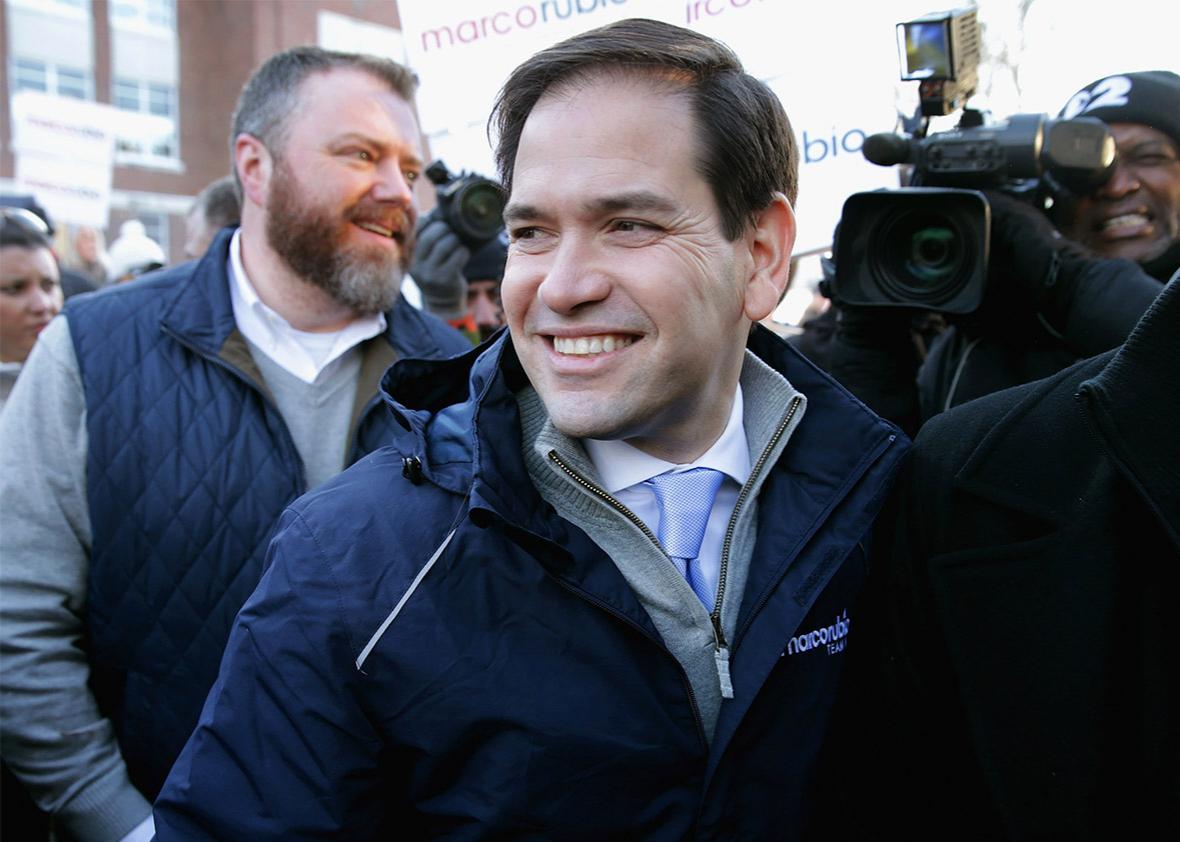There’s an unspoken premise behind the delighted glee that has greeted Marco Rubio’s meltdown at last weekend’s debate. When his critics call him a robot—or when they chide him for reciting talking points—they are making a nasty implication: His words are not his own. Off in the distance, some unseen machinator is feeding him his lines. Which, of course, raises the question: Whose words are they?
The discussion of Rubio’s glitches doesn’t usually land on this question. To many of his critics, the essential takeaway is that Rubio lacks intelligence, or at the very least the ability to think on his feet. The rote repetition proves he lacks the intellectual nimbleness to be president. This accusation strikes me as unfair. Anyone who has watched Rubio in town hall meetings can see his gift for clever, improvised asides and his genuine policy fluidity. Every politician subjected to endless debates and campaign events must rely on stock paragraphs. John McCain, who received lavish praise for his spontaneity, unloaded the same canned jokes and anecdotes and proscriptions over and over and over. There’s not much evidence to suggest that Rubio has an unusual political genius, but there’s nothing that proves that he’s any less smart than the competition either.
The accusation that he’s someone else’s puppet is more substantial. It’s a question that has shadowed his whole career—and it’s not surprising that it’s come into focus just now. The Republican establishment was poised to close ranks around Rubio after his stronger than expected finish in Iowa. The comfort lobbyists and backroom operators were beginning to show with him created an air of suspicion among conservative voters, which a skillful debater like Christie could exploit. Why are party elders and Fox News commentators so confident in him? After all, Rubio is a former poster boy of the Tea Party who endorsed the populist Mike Huckabee in 2008 and has staked out an extreme position on abortion—why, exactly, is the establishment so confident he’ll do their biding? Their enthusiasm could merely suggest desperation for a viable challenger to Trump and Cruz. Or it could betray that the GOP sachems know something voters don’t. Perhaps they know that Rubio will be the type of lapdog to whom you can feed talking points and, more worrisome, dictate policy.
This image of Rubio as a cipher is at once an unjust caricature and a pretty accurate summation of his career. Since Rubio’s earliest days in law school, Republican big wigs have swooned whenever he opens his mouth. They saw his silver tongue and charm, as well as a demographic dreamboat: the ambitious son of Cuban immigrants, who worked his way up from modest means in Florida, the state on which presidential elections turn. Rubio came on the scene as California Gov. Pete Wilson and his anti-immigrant crusade were crashing the Republican Party’s share of the Latino vote. It was the very moment that George W. Bush and his mangled Spanish were making a concerted effort to undo that damage.
Rubio was an irresistible figure, quickly marked for bigger things. At every stage of his career, powerful benefactors—including Jeb Bush—pushed Rubio forward. It’s how he became the youngest speaker of the Florida house. And it’s the reason that strategists began imagining a Rubio presidential bid nearly as soon as he arrived in Washington.
None of this distinguishes him from other bright young things in every state capital of America. Yet Rubio’s ascent came with several clouds that he’s never been able to escape. The first is ideological. His rapid-fire transformations on immigration—from Tea Party to Chuck Schumer’s fellow gangster and back again—suggest that he lacks core beliefs. They create an impression of a man vulnerable to manipulation—without principles and courage, the very sort who would bend his views to those of his masters.
Then there’s the matter of Rubio’s finances. As he freely admits, they are a mess. He’s been saddled with debt, unable to cover the costs of family birthday parties and renovations to his home. (When he left the Florida state house in 2008, he had a net worth of $8,351.) The dire state of his bank accounts has made him reliant on benefactors. He needed the Florida GOP’s American Express card to help him bridge his expenses. And more glaringly, he’s relied on an old auto dealer called Norman Braman. Ever since Rubio entered politics, Braman has showered him with donations, hundreds of thousands of dollars of assistance, by the New York Times’ estimation. He even gave Rubio’s wife a job as an adviser to his family foundation. Back in 2008, Braman predicted that Rubio would be the first Hispanic president. Seeing that happen in 2016, he told the Times recently, is “part of my legacy.” Rubio, meanwhile, has shoveled public money to causes dear to Braman, including a cancer research center bearing his name.
Another accusation—or perhaps compliment—dogs Rubio: that he is the Republican Obama. On one level, this is true. They both arrived in the Senate as young, fresh saviors of their party. And their youth and uncluttered records made them blank slates onto which enthusiasts could inscribe their hopes. It allowed them to capture the imaginations of disparate groups, each able to project their conflicting visions onto the men. But there’s a big difference between the two—and Rubio’s debate glitch distilled it. Obama carried a confidence that suggested core convictions and deep thinking about how he might lead. Rubio has convictions, too; some of these have led him to positions that are several terrifying clicks to the right of mainstream conservatism. But his stammering and repetition suggest that he’s not so certain about what he believes, that his smooth exterior might just be someone else’s creation.
